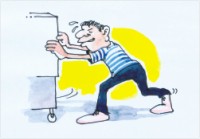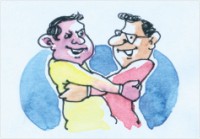| Learner's Club
Idioms connected with the world of worky
Idioms are phrases or expressions of a given language where the meaning is not literal but figurative. If you translate an idiom literally into another language, it probably won't retain the same meaning. Also, the origins of an idiom may be steeped in its culture; therefore it is a reference outsiders may find hard to understand. Nevertheless, these are crucial if we are to get good at communicating in English. Here are some.
|
Hiring and firing
take on = hire someone: "They're taking on more than 500 people at the canning factory."
get the boot = be fired: "She got the boot for being lazy."
give someone the sack = fire someone: "He was given the sack for stealing." |
 |
| 
|
give someone their marching orders = fire someone: "After the argument, he was given his marching orders."
How do you work?
get your feet under the table = get settled in: "It only took him a week to get his feet under the table, then he started to make changes."
burn the candle at both ends = work day and night at something: "He's been burning the candle at both ends to finish this project."
knuckle under = stop wasting time and start working: "The sooner you knuckle under and start work, the better."
put pen to paper = start writing: "She finally put pen to paper and wrote the letter." |
work all the hours that God sends = work as much as possible: "She works all the hours that God sends to support her family."
work your fingers to the bone = work very hard: "I work my fingers to the bone for you."
go the extra mile = do more than is expected of you: "She's a hard worker and always goes the extra mile."
pull your weight = do your fair share of the work: "He's a good team worker and always pulls his weight."
pull your socks up = make a better effort: "You'll have to pull your socks up and work harder if you want to impress the boss!"
put your feet up = relax: "At last that's over - now I can put my feet up for a while."
|

|
| 
|
Office politics and relationships
get on the wrong side of someone = make someone dislike you: "Don't get on the wrong side of him. He's got friends in high places!"
butter someone up = be very nice to someone because you want something: "If you want a pay rise, you should butter up the boss."
the blue-eyed boy = a person who can do nothing wrong: "John is the blue-eyed boy at the moment - he's making the most of it!"
get off on the wrong foot = start off badly with someone: "You got off on the wrong foot with him - he hates discussing office politics."
be in someone's good (or bad) books = be in favour (or disfavour) with someone: "I'm not in her good books today - I messed up her report."
a mover and shaker = someone whose opinion is respected: "He's a mover and shaker in the publishing world." |
pull a few strings = use your influence for something: "I had to pull a few strings to get this assignment."
take the rap for something = take the blame for something: "They made a mistake, but we had to take the rap for it."
call in a favour = ask someone to return a favour: "I need a holiday - I'm going to call in a few favours and ask the others to cover for me."
put your cards on the table = tell people what you want: "You have to put your cards on the table and tell her that you want a pay rise!"
beat around the bush = not say exactly what you want: "Tell me - don't beat around the bush!"
sit on the fence = be unable to decide about something: "When there are arguments, she just sits on the fence and says nothing."
|

|

|
pass the buck = pass on responsibility to someone else: "The CEO doesn't pass the buck. In fact, he often says "the buck stops here!"
take someone under your wing = look after someone: "When he was taken on, Sarah took him under her wing."
show someone the ropes = show someone how things are done: "My predecessor showed me the ropes, so I felt quite confident."
be thrown in at the deep end = not get any advice or support: "He was thrown in at the deep end with his new job. No-one helped him at all."
a them and us situation = when you (us) are opposed to "them": "The atmosphere between the two departments is terrible. There's a real them and us situation." |
Copyright
(R) thedailystar.net 2007 |
|
